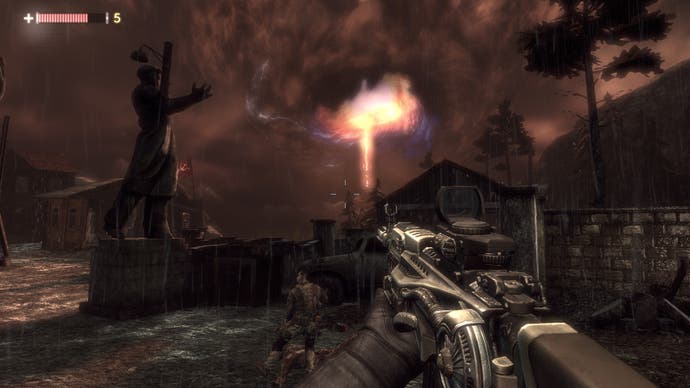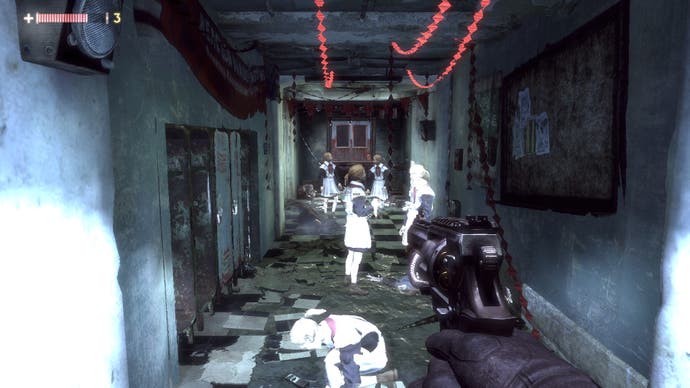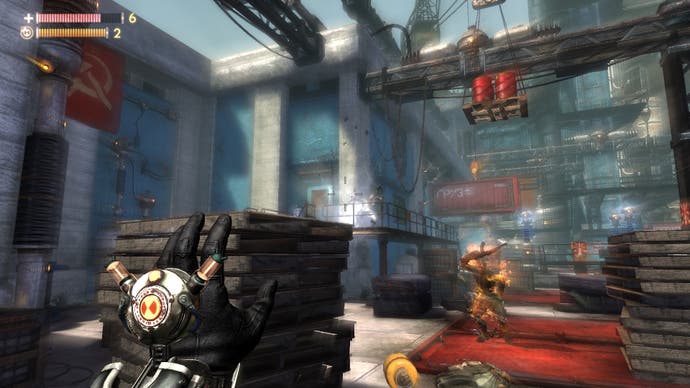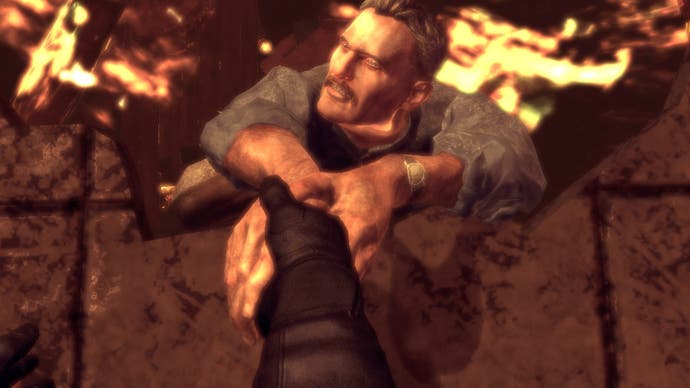Remembering Singularity, Raven Software's forgotten shooter
Insert coin to continuum.
You may remember Singularity as the game Activision wanted to forget. Developed by Raven Software - formerly the creators of Heretic, Soldier of Fortune, and Jedi Outcast - Singularity was released in 2010 with minimal fanfare. It received mostly respectable reviews but sold poorly, in no small part because Activision kicked it out of the door with so little support it made Universal Credit look like winning the lottery.
It was a truly bizarre sequences of events, almost as if Activision wanted the game to do badly. The tragic irony is that Singularity is a more interesting singleplayer FPS than every Call of Duty Activision has released since Modern Warfare, combining a high-concept, time-hopping story with oodles of clever mechanics, and a weapon-roster to rival Bulletstorm and Titanfall 2.
You play Sergeant Renko, a special operative dispatched to the Russian island of Katorga to investigate anomalous readings picked up by a US satellite. Once there, you discover a crumbling Soviet facility dedicated to researching a substance known as E-99, more powerful than the atom bomb and twice as volatile. Indeed, only an accident at the facility in 1955 spared the West from annihilation, causing the Russians to abandon the island.

Upon your arrival, an emission from the site cascades you back to 1955, depositing you right in the middle of the accident. Amid all the fire and screaming, you bravely save the life of the one man on Earth who is Literally Worse Than Stalin, sprouting an offshoot timeline in which Russia rules the world. Or at least, an offshoot timeline where it rules it through force and technological superiority rather than through troll factories and Manchurian candidate-style political gamesmanship. 2018 folks, it's hard to ignore!
As a story it's B-movie shlock, exploring the grandfather paradox through the medium of shooting everybody and their grandfather. But it's entertaining B-movie shlock, deploying its time-travel gimmick in a way that's both fun and intelligent enough to keep you interested. At the centre of the plot is the time manipulation device. A nifty-looking glove the player acquires early-on, the TMD allows you to "age" and "de-age" certain objects. Point it at a safe, and its hinges will rust in an instant. Point it at an enemy soldier, and they'll immediately transform into Keith Richards.
Officially, this is Singularity's core mechanic. But in practice it's more of a gimmick. Like Bioshock Infinite's disappointing "tear" concept, the number of objects you can use it on is fairly limited, and there's little in the way of creative potential. Mainly the TMD is used to return ammo-crates to pristine condition and repair the least portable recording devices in the history of audio-logs. Seriously, why is everyone lugging these giant metal boxes around to record their last words when the sky is falling in?
Singularity doesn't let you play with time in the way that Timeshift (another decent yet forgotten FPS) does. But the game has so many other clever ideas that frankly it doesn't matter. Take the weapons. Alongside the familiar assault rifles and shotguns, there's a sniper rifle which slows down time, another sniper rifle that lets you steer its bullets, a railgun that fires exploding metal spikes, and possibly the best chaingun in all of gaming, shredding enemies into dog-food. Marvellous.

On top of this eclectic arsenal, you can pick up and launch environmental objects - as with Half Life 2's gravity gun - while your melee attack is a pulse of energy that, when upgraded, makes enemies burst. Aside from some slightly tinny sound-design, it's one of the best and most imaginative weapon rosters ever committed to code.
Singularity also excels at placing its combat in an interesting context. The action alternates between present-day Katorga and 1955 Katorga, and the two timelines become gradually more intertwined as the game progresses. The ghosts of the island's Soviet inhabitants haunt the cracked streets and crumbling edifices of the present day, and at various points emissions from the Singularity will either dump you into the 1955 timeline or propel soldiers of the Red Army into yours. There are even strange, ghost-like mutants that shift in an out of your time-line as they attack you, as well as various other creatures horribly deformed by E-99.
Singularity's action peaks toward its centre, when the player raises a wrecked cargo ship named the Pearl from its resting place on the seafloor of Katorga's docks. The TMD can't sustain such a large object in its de-aged form for long, so as you search the ship for your objective, the Pearl begins to decay around you, bolts rusting, walls-griming, staircases collapsing, hulls splitting. It is beautifully choreographed, one of the unsung highlights of the scripted FPS, and the fittingly named jewel hidden in Singularity's oyster.
So why isn't Singularity ranked among the madcap FPS greats? Undoubtedly it being released with zero marketing footprint has something to do with it. But there are other issues at play too. Firstly, it's an astonishingly ugly game, developed at a time the style du-jour for action games was Too Much Brown and Too Much Bloom. What's especially annoying is Singularly does have potential to be pretty. The 1955 sections are far more colourful, featuring tungsten-blue laboratories adorned with the crimson banners of the Soviet Union. But these segments only accounts for about 20 per cent of the overall playtime.

Mostly though, there's a sense that Singularity was rushed to completion. The Pearl sequence feels like it should form the halfway point, but it's only about two hours from the conclusion. In these latter stages, the environments take a notable dip in quality, while the story is in such a hurry to conclude that it literally throws one of its core characters overboard in order to get there. The only thing holding Singularity together at this point is its own momentum, as it barrels through set-piece after set-piece, discarding mechanics left right and centre. In a way it's quite remarkable, you can almost feel the game collapsing in on itself as you sprint towards the end, as the developers hasten to stitch together the half-finished levels and ideas, shoring them up as best they can.
Prior to returning to Singularity, I imagined it to be the runt of Raven's respectable litter. In fact, part of me hoped that it was, because Raven hasn't developed a game of its own for eight years, and part of me wanted Singularity to be sufficiently terrible to justify that. Now though, I think it might be one of the better shooters released in the last ten years, gloriously loopy, ludicrously gory, and just a whole lot of silly, yet cleverly designed fun.
All of this makes me more desperate to see Activision let Raven out of its cage, to release the studio from its endless loop of "assisting" with Call of Duty's development and allow it to make its own game again. Ideally something as bold and silly and off-kilter as Singularity was the first time around, but if that seems too scary, I'd happily take a second opportunity to rewrite history.



